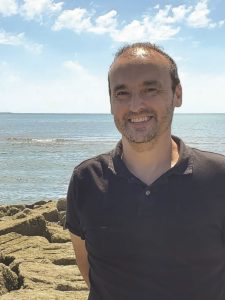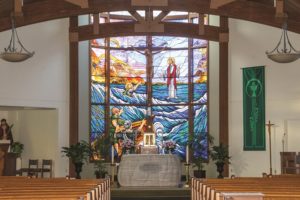PROVINCETOWN — Mike Dubour was in the process of converting to Judaism. He was tired of the lousy version of Catholicism he kept receiving — what he described as “hatred and bigotry clothed in Catholicism.” As a gay man, he felt that there was no reason to go back to the Catholic Church. It offered, he said, “no message of love and, therefore, no message of God.”
What he wanted was a reform movement and spiritual discipline. Judaism, to Dubour, felt “like a richer faith.”
He was living in New York City at the time and confided in a friend about his search for spiritual direction. Had he ever tried the Catholic church down in the Village? his friend asked. The parish there was actually very open.
Dubour checked it out. “I was waiting for words of hate — those messages we fear as gay men,” he said. “But I didn’t hear any of that. I heard words of encouragement and of service.

“I was shocked that the pastor was very supportive of LGBTQ rights,” he added. “He was big on social justice. It is what I would call true Catholicism.”
The church was St. Francis Xavier, and, as it happened, there was a gay men’s spirituality group that met in the parish center there. Dubour attended a meeting and immediately felt a part of it.
In 2016, Dubour relocated to Provincetown and started a similar group at St. Peter the Apostle Church here.
The group meets in the church on the second Sunday of every month at 3 p.m. They open with prayer and Scripture. They talk about what they’ve just read, and how it can be applied to their lives. There’s also a community topic of conversation, picked by one member of the group — a current event in the news that they talk about through the lens of the Catholic faith. Before Covid, they would then head to dinner, breaking bread with one another.
The Catholic Church has a complicated relationship with the world’s LGBTQ community. Although the Church calls on Catholics to treat LGBTQ people with “dignity and respect,” the Catechism states that “homosexual acts” are “intrinsically immoral and contrary to the natural law.” It calls on gay Catholics to practice chastity. For the Church, homosexuality is not a sin, but the acts homosexuals might commit are sinful.
It’s a distinction that might make sense for those who become priests, who are obliged to observe “perpetual continence.” Gay men make up an estimated 30 to 40 percent of the American Catholic clergy, according to research published in the New York Times.
And the formal teachings of the Church are not reflected in the views of Catholic parishioners. In a 2019 survey conducted by the Pew Research Center, 61 percent of U.S. Catholics said they support same-sex marriage, and 76 percent said society should be accepting of homosexuality.
“The people of the Church are the Church,” said Don Murray, who leads the gay men’s spirituality group at St. Peter the Apostle in the summer.
Murray often finds himself turning to Catechism 1776 as a reference point for the good Catholicism can do. It reads that the voice of moral conscience calls man “to love and to do what is good,” and situates the conscience as “man’s most secret core and his sanctuary. There he is alone with God whose voice echoes in his depths.”
Progressive ministries today, Murray explained, see social justice lessons in the Christian story. “Jesus was marginalized just like us,” he added. “That’s why I have an appreciation for all of our marginalized groups. We’re all going through the same thing, just like he did.”
Murray came out in his late 20s. He was struggling and went to see a therapist, who said to him, “You can’t come out and do this religion at the same time. We’re going to take the religion out. You’re going to come out. And then we’ll bring the religion back in.”
Murray, with his partner and their adopted child, lives in Provincetown from May through October. The rest of the year, they are in Tampa, where he has set up a gay spirituality group. “My goal is to bring fallen Catholics back to the Church,” he said. “They want to come, but they don’t feel like they’re welcome. I want them to know that they actually are.”
Locally, he’s up against memories that St. Peter’s parishioners signed a 2003 petition, circulated by the bishop of Fall River, that opposed gay marriage. The petition was made public, and Provincetown’s gay community saw the names of neighbors and local business owners who sought to keep their relationships unequal and illegitimate.
At St. Peter’s today, the Rev. Hugh McCullough, known by all as Father Mick, said that he “couldn’t run this church without the support of our gay Catholics here. They do so much. We love them here.”
Jerry Cassessi is one of those gay parishioners who does so much: he is the cantor at St. Peter’s and also does flower arrangements on the altar for special occasions. “I’m basically in charge of maintaining the look of the church,” he said. “It’s a lot of detail work. I make up a fresh garland for the altar stone.
“When I found out Michael was forming this group, it was very exciting — just the thought that gay Catholic men could help one another as a group,” Cassessi added.

Even 10 years ago, Cassessi said, such a group would not have been possible. But in October 2020, a documentary about Pope Francis, Francesco, premiered and, in it, the Pope made a statement endorsing civil unions for same-sex couples.
The Pope’s leadership has made a difference, in Cassessi’s view. “With Pope Francis preaching the love of God for everyone,” he said, “no matter who you are and what your sexual preference is — God made you and God loves you.”
Some paradoxes remain. Are sexual acts committed in a civil union still sinful, since they’re outside of marriage? Pope Francis has said, “Who am I to judge?” Does the fact that we now have a Catholic president who supports LGBTQ rights and is pro-choice change anything?
“I love seeing Biden go to church,” Murray said. “He is not afraid. He’s bringing faith back. It’s not out of fashion. He doesn’t care what other people think. And that’s what we have to do as LGBTQ Catholics.”
